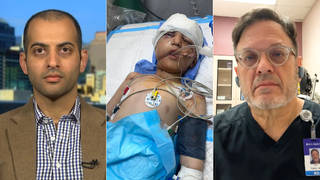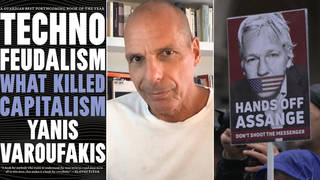
Related
Guests
- Sherrod Brownsenator-elect (D–Ohio).
Sherrod Brown is one of the six Democrats who defeated Republican incumbents in the Senate in November. Brown has served as a congressmember in Ohio’s 13th District since 1993 and has been one of the most progressive lawmakers on Capitol Hill. We speak with the incoming Ohio senator about his election win, the Iraq War, Donald Rumsfeld’s resignation and why he voted for the Military Commission Act. [includes rush transcript]
Transcript
AMY GOODMAN: Sherrod Brown is one of the six Democrats who defeated Republican incumbents in the Senate in November. Brown has served as a congress member in Ohio’s 13th District since 1993 and has been one of the most progressive lawmakers on Capitol Hill. He voted against the war in Iraq, against the PATRIOT Act, against warrantless wiretapping and against the gay marriage amendment. The New York Times says Brown opposed President Bush’s stated position more frequently in 2005 than any other member of Congress. In the early days of the invasion of Iraq, Brown took to the House floor nearly every night to read letters from constituents opposing war.
I spoke with Sherrod Brown last night here in New York. He began by talking about his election in Ohio to the U.S. Senate.
REP. SHERROD BROWN: I think that people feel in Ohio that their government betrayed them, that they saw a state government that was corrupt, they saw a federal government, where the drug companies and the oil companies and Halliburton and companies like that simply had too much power and betrayed the middle class. And voters wanted a United States senator who would fight for the middle class and fight for working families and stand up for the poor.
AMY GOODMAN: Are you concerned about the voting in Ohio, the key battleground state as we move into 2008, and even what happened now?
REP. SHERROD BROWN: We have a new secretary of state in Ohio, who’s terrific. She is as concerned about the electronic voting and concerned about the whole election system as anybody that’s watching this or anybody I know around the country or in Ohio. I am very confident that in 2008 people’s votes will count. I don’t think they did in 2004. I think in 2008, they will.
AMY GOODMAN: You called for the resignation of Donald Rumsfeld in November of 2003. That’s a long time ago.
REP. SHERROD BROWN: Well, Rumsfeld — I mean, if Rumsfeld had held your job or the job of darn near anybody in America, he would have been fired long before he was. I mean, he clearly was incompetent. He clearly didn’t tell the truth. He clearly continued to deceive. And, I mean, the war was wrong to begin with, but the way Rumsfeld argued for it and pushed the administration, and then his conduct of the war and his conduct of all the civil liberties questions around the world were simply wrong.
AMY GOODMAN: There has been a lawsuit filed against him in Germany by the Center for Constitutional Rights here in New York, charging him with war crimes. Do you agree with that?
REP. SHERROD BROWN: I don’t know. I don’t know enough about the lawsuit. I do know that there will be and should be oversight investigations about his conduct of the war. There will be and should be oversight of Halliburton non-bid contracts. And there will be, throughout the Congress, we need to hold them accountable. We still need to move forward on minimum wage. We need to end this war. We need to deal with helping middle-class kids get a college education. We also need to do the kind of investigative oversight that I think the public wants and that our government deserves and needs.
AMY GOODMAN: What you think is the solution for Iraq right now?
REP. SHERROD BROWN: I think the solution in Iraq is that we instruct the generals to come up with an exit strategy that will get us out of Iraq. I said in my campaign within 18 months. Now, I think the redeployment needs to be, as the situation’s gotten worse, needs to be accelerated so that it’s quicker than that. Otherwise, Iraq will never build their own security, police and military forces, and they’ll never come to the compromise that they need to among the Shiites, Kurds and Sunnis, until we tell them we’re leaving and this is when we’re leaving.
AMY GOODMAN: Why not call for the troops to come home now?
REP. SHERROD BROWN: I think you call for — I think if we leave immediately, the Iraqis don’t really prepare for our leaving. You give a date. It can be 12 months from now, it can be 18 months from now. But you begin the troop redeployment immediately, but you give them that end date, when they need to be ready to take back their country.
AMY GOODMAN: What’s going to be your first act in office as a senator?
REP. SHERROD BROWN: My first act, I hope, is to vote for a minimum wage increase, the first or the second day in office.
AMY GOODMAN: Well, you’re leaving the House, and Nancy Pelosi has called for impeachment off the table and is against pulling the funding of the war. What are your thoughts, as you move into the Senate, on those two issues?
REP. SHERROD BROWN: I think we, rather than impeachment or censuring of the president, I think we need — because will look to the public as just more tit-for-tat. We need to do things for the country. That means increase the minimum wage, set up direct negotiations for drug prices, to get the Medicare law working for seniors rather than for the drug companies, pass the 9/11 Commission recommendations, pass middle-class and working people incentives for going to college. We need to do things for this country. And the investigations of the White House, the investigations for wrongdoing should be part of that, but I don’t want to get into looking like we’re engaging in retribution. I want to do things for the people of this country.
AMY GOODMAN: Right before the election, you voted for the Military Commissions Act, which stripped habeas corpus. Why?
REP. SHERROD BROWN: I think that if we had done nothing, the prisoners would continue in Guantanamo Bay with no resolution. That will at least move the process forward. They’re either tried, or they’re freed. I didn’t think they should be given more rights than American troops who are court-martialed. I think we can fix that. I think we can make the bill better. I think we ought to go back and do that, come this year.
AMY GOODMAN: Restore habeas corpus?
REP. SHERROD BROWN: Yeah.
AMY GOODMAN: You would support that?
REP. SHERROD BROWN: I would support that.
AMY GOODMAN: Would you introduce that?
REP. SHERROD BROWN: Probably not.
AMY GOODMAN: Why not?
REP. SHERROD BROWN: Because I have other priorities.
AMY GOODMAN: What are your priorities?
REP. SHERROD BROWN: My priorities are a fair trade policy in this country, increasing the minimum wage, going after the drug companies for the way that they charge and their whole pricing structure that have put absolutely amazing drugs out of reach for so many Americans.
AMY GOODMAN: In 2008, what do you think of what’s going to happen? Are you coming out as an early supporter for any of the Democratic candidates for president?
REP. SHERROD BROWN: I frankly don’t have much opinion yet about who runs. My interest is that whoever runs runs the kind of populist campaign, stands up for the middle class, stands up for working families, the kind of campaign I ran in Ohio, because if you’re — it’s the question of whose side are you on. I want a presidential candidate, not to move to the middle and stand for nothing, but to be a progressive voice that will stand up for working families, stand up for the middle class, stands up for people with less advantage. That’s how you win elections. That’s how you build a base to govern in this country the way that we should turn our government towards.
AMY GOODMAN: Finally, we interviewed a man this week, Lieutenant Ehren Watada. He’s the first officer to refuse deployment to Iraq. He’s about to be court-martialed. What do you say to soldiers who are saying no, they think it’s immoral, they think it’s wrong to go to Iraq?
REP. SHERROD BROWN: I think you say that there are — I don’t know. I don’t know what you say. I think that there are a lot of people in this country that have had it with this war. And I think the best thing I can say to him is we want to end this war as fast as we can.
AMY GOODMAN: Do you think that there should be pressure on the military not to court-martial these men and women who are saying, just like many politicians, just like you have said, that the war is wrong?
REP. SHERROD BROWN: I don’t know. I really don’t know. I mean, I’m not a military person. You know, the way military law works, I don’t know. I don’t know the answer to that.
AMY GOODMAN: The senator-elect from Ohio, Sherrod Brown, many-term Democratic congressmember. This is Democracy Now!, democracynow.org, the War and Peace Report. We were speaking last night in New York.
Medea Benjamin and Cindy Sheehan, two of the leading peace activists in this country are with us in studio. Your response? Let’s begin with you, Medea.
MEDEA BENJAMIN: Well, it’s a shame that somebody who is so good on economic issues and one of our best allies on things like stopping the free trade agreements doesn’t understand that the only way to stop this war is to cut off the funds. He avoided the whole question. You asked him, was he going to vote to cut off the funds. He didn’t answer. The fact that he wouldn’t praise Ehren Watada and those who are saying no to a war that he himself thinks is wrong is also a reflection of his inability to just be straightforward and say, “The war is wrong. The troops have to come home. The only way we’re going to bring them home is if we cut off new funding for the war, and I applaud those who say they’re not going to fight in this war.”
AMY GOODMAN: Your son fought in this war, Cindy Sheehan, and you lost him in Iraq. Your response to the issue of cutting off funds means you’re not supporting the troops?
CINDY SHEEHAN: Well, first of all, he has a very ambitious domestic agenda. How is he going to get this through, when we’re spending $10 million dollars an hour in Iraq? Where’s the money going to come from? We need to take care of our people at home. Our trip should not be in Iraq. This month, almost five of them a day are dying. Nobody in Congress, nobody in the Senate, has children over there. How many more are going to die in this 18 months? How many more Iraqis are going to be slaughtered?
And we can’t allow our elected officials to say that they’re against the war if they vote for more money. Clearly, in Campbell v. Clinton in 1999, the Supreme Court said that our elected officials give explicit approval for war when they vote for funds. So we have to stop letting our elected officials say they’re against the war, if they’re going to vote for funds.
And our kids never should have been there in the first place. And the only way we can support them now is to bring them home, because they’re not the ones getting these billions of dollars, anyway. They’re still going without so much. They’re still going without things to help them survive. The people that are getting the money are Halliburton and Exxon and the private contractors there. So, cutting off the funds means cutting off the profits for the war profiteers.
AMY GOODMAN: Medea Benjamin, your thoughts on the idea of immediate withdrawal today, tomorrow? You’ve been to Iraq many times. What about the assertions of the Iraqi government now, which ultimately criticized the Iraq Study Group, which wasn’t even talking about an immediate withdraw, concerned about abandonment?
MEDEA BENJAMIN: I think our role as the peace movement is to say bring the troops home now. If there is a timeline that is set that is the end of 2007, I would support that, because I think that gives a chance then to move towards a reconciliation plan, where the Iraqis themselves could sit down and work out some kind of post-U.S. occupation government.
AMY GOODMAN: And do you see that happening?
MEDEA BENJAMIN: I see it happening, if we do our job. And what I see as the real danger ahead is the peace movement thinking, “Ah, the Democrats are coming to power. Oh, there’s a plan out there. Let’s give them a little time.” This is the hardest time for the peace movement, and this is when we have to be the strongest.
We have possibilities now coming up in January. As soon as they are sworn in in the new congress, we have to be there. January 3rd and 4th, Gold Star Families, CodePink and other groups are planning on being in Washington, D.C. We have a big mobilization. United for Peace and Justice is organizing for January 27th. We have the next anniversary of the war coming up, March 17th. We’ve got to be out on the streets. We’ve got to be in the offices of our congresspeople. If not, this war is going to go on and on, and we’re going to be facing another presidential election with two pro-war major candidates from the Democrats and Republicans.
AMY GOODMAN: You were just in South Korea, both of you, Medea Benjamin and Cindy Sheehan. Why?
CINDY SHEEHAN: We were there to — we were invited by Korean peace groups to come. We went to a village, Daechuri, and Pyong-taek, by Camp Humphreys, a U.S. military base that is slowly eating the entire village. It’s taken their farmlands. It’s demolished their houses. Part of the reason they’re taking their lands is for a golf course. So we went there to resist this creeping and cancerous militarism basically around the world, that is compromising and oppressing peoples in other countries. And this is U.S. militarism that’s going on.
And also, the people of South Korea that we talked to want unification, and they say that that —-— with North Korea, reunification. They say that can’t happen with the U.S. military presence there. So we just went as part of a delegation to stand in solidarity with the Korean peace movement, with the anti-militarism movement there in South Korea.
AMY GOODMAN: Medea Benjamin?
MEDEA BENJAMIN: We also were there because South Korea has the third largest contingent of troops in Iraq, after the U.S. and the U.K. And so, there has been a movement in South Korea to force the government to bring their troops home. In fact, we met with members of parliament from all the different parties who had just returned from Iraq and said South Korean troops have no business in Iraq. So we were there to support that movement to bring their troops home.
AMY GOODMAN: Speaking of meeting with members of legislative bodies, soon after the Democrats took over Congress, you and a group of people went to meet with Nancy Pelosi. Does Nancy Pelosi — is she your congressmember?
MEDEA BENJAMIN: Yes.
AMY GOODMAN: And she is also the first woman speaker of the House. What did she say? What are your comments about her saying the cutting off of funding for the war is off the table, the cutting off of — impeachment is off the table?
MEDEA BENJAMIN: We say nothing is off the table, that Nancy Pelosi has to represent the voice of the people in her district first, which is the most progressive district, perhaps, in the country. We have already voted very democratically that we want to see President Bush impeached. We have already voted that we want to see the troops out immediately from Iraq. So she has to represent her district.
And we have an opportunity right now, with her having this powerful position, to really put the pressure on her. So I am very anxious for the new year to start, because we have plans both in her district and at her office in Washington, D.C., to say she must be a leader, she must listen to the people. She can’t decide she’s taking off the table something that is so important to now the majority of people in this country, which is end the war. And the only way you’re going to end the war, Nancy, is not talking bad about President Bush’s policy, but cutting the funding for the war.
AMY GOODMAN: The last act of outgoing Congressmember Cynthia McKinney of Georgia was to call for the impeachment of President Bush. Your response, and also to her ouster? She will be leaving Congress now, Congressmember McKinney.
CINDY SHEEHAN: Well, we, Medea and I, both were in Georgia the day of her first election, when she failed to get enough votes to — she had to have a runoff. Cynthia McKinney has been a very outspoken and very courageous member of Congress, who, you know, was very outspoken against the war, against George Bush and his policies. And I believe that impeachment needs to be talked about. It needs to be debated. It needs to be discussed, but it has to be from the people. We have to put pressure on Congress. It can’t come from a special prosecutor. It can’t come from anything else, but we the people saying that we want it on the table, that we set the table. And when that happens, then Congress will have the courage to do the same thing.
So I just believe that Cynthia McKinney’s proposal just brought the debate out. And we just had a whole weekend full of impeachment forums, 60 of them all over the country. I spoke with Liz Holtzman, who sat on Richard Nixon’s investigative body. And it has to be reasoned. It has to be reverent. We have to obey the Constitution. We have to take everybody’s feelings into consideration. It has to be nonpartisan for it to be effective. Bill Clinton’s impeachment was a miscarriage of the Constitution. It was a travesty. It wasn’t good for the country. But I believe George Bush’s impeachment and removal from office will be good for the country and good for the whole world.
AMY GOODMAN: And your response to the outgoing Defense Secretary Donald Rumsfeld visiting Iraq for a final time in that surprise weekend trip?
MEDEA BENJAMIN: Well, I think we’re delighted that Donald Rumsfeld is gone, not that Robert Gates is such a great replacement. But I think it’s important that we see some of the worst warmongers leaving. We’re delighted that John Bolton is leaving from the United Nations. And we’re looking forward to a new year, where the peace movement feels reinvigorated.
AMY GOODMAN: I want to thank you both for being with us, Medea Benjamin and Cindy Sheehan.
CINDY SHEEHAN: Thank you, Amy.
AMY GOODMAN: Cindy is one of the founders of Gold Star Families for Peace, lost her son Casey on April 4, 2004, in Sadr City, Iraq. And Medea Benjamin is one of the co-founders of Global Exchange and CodePink.












Media Options